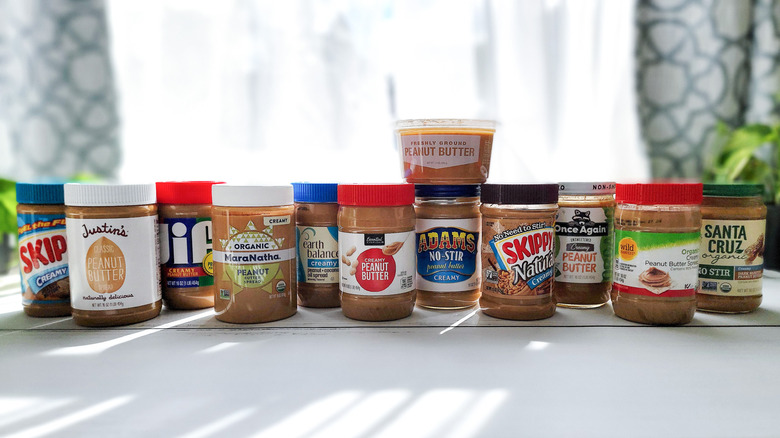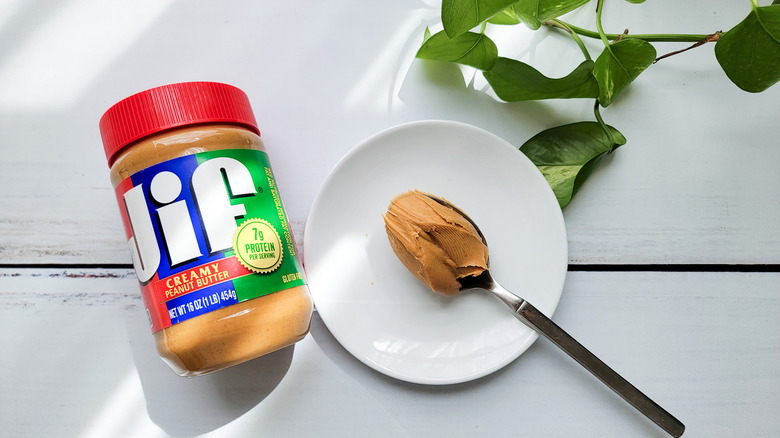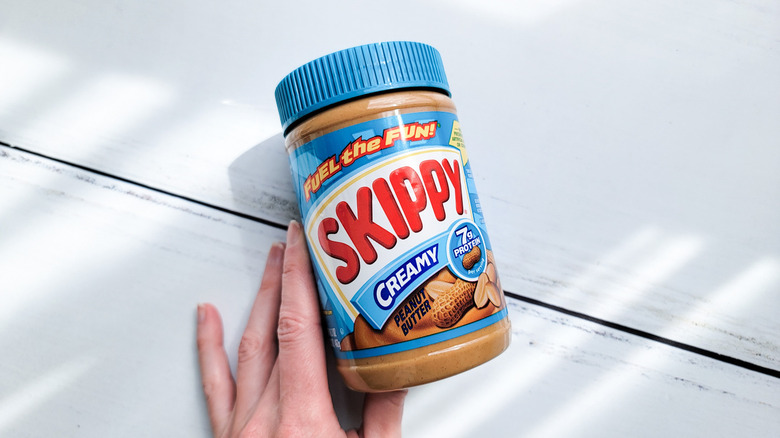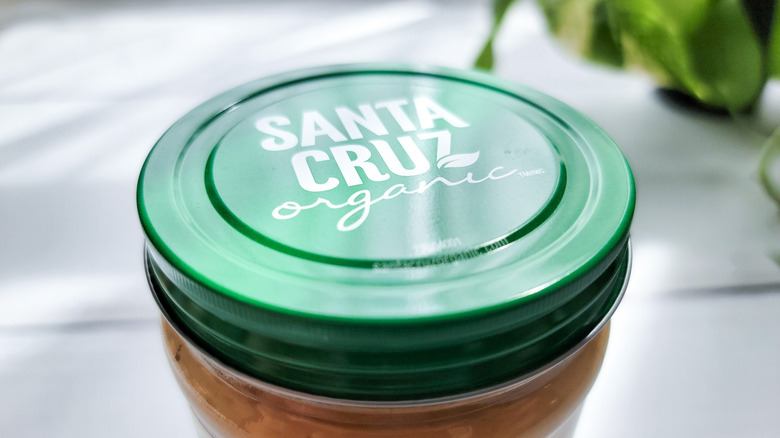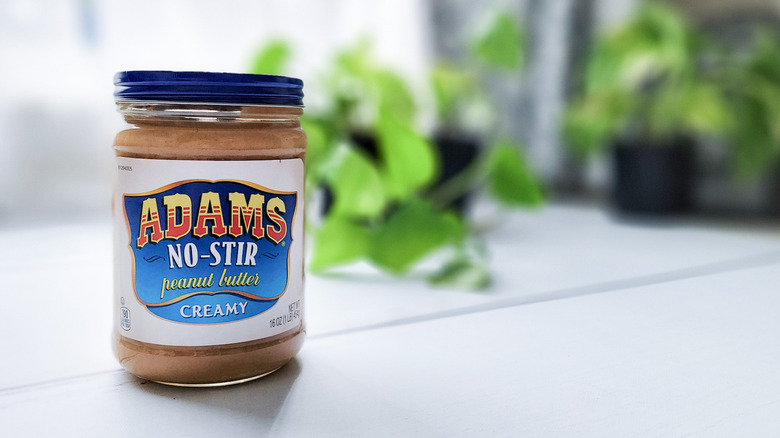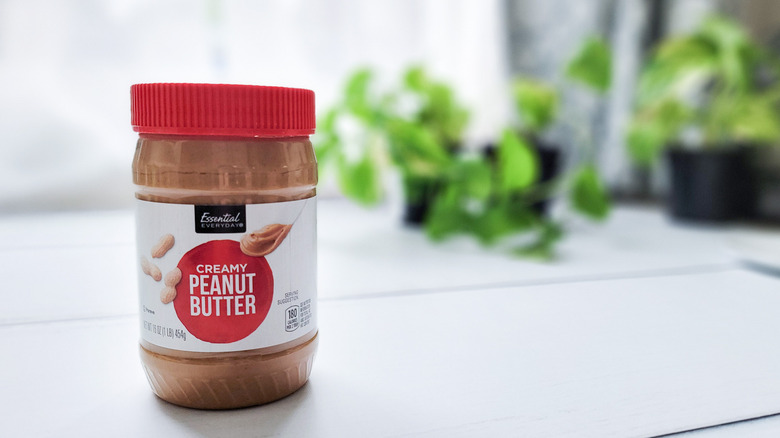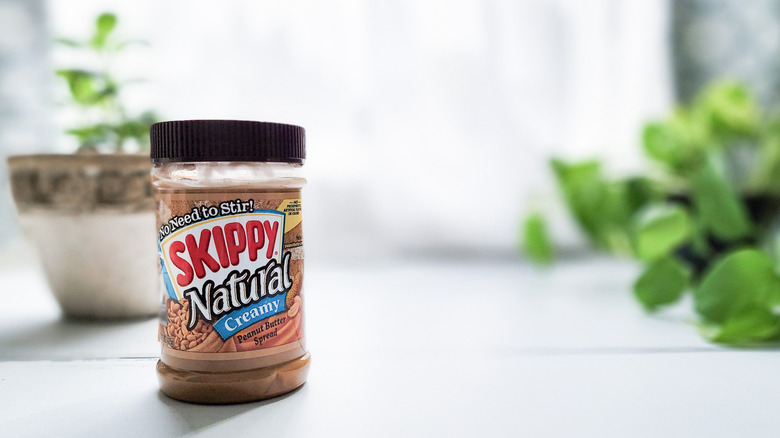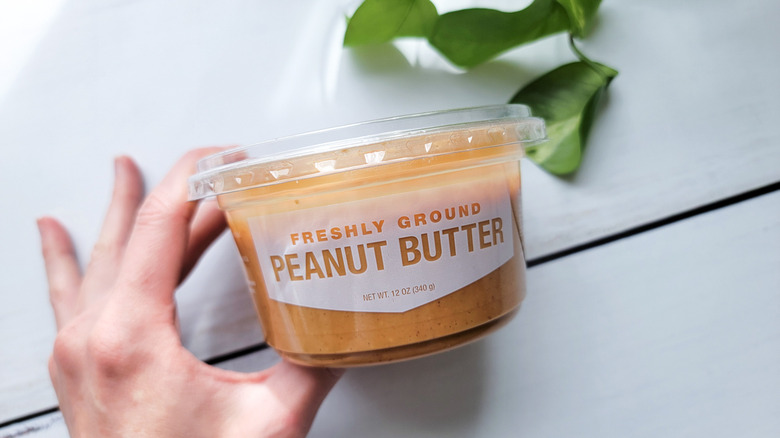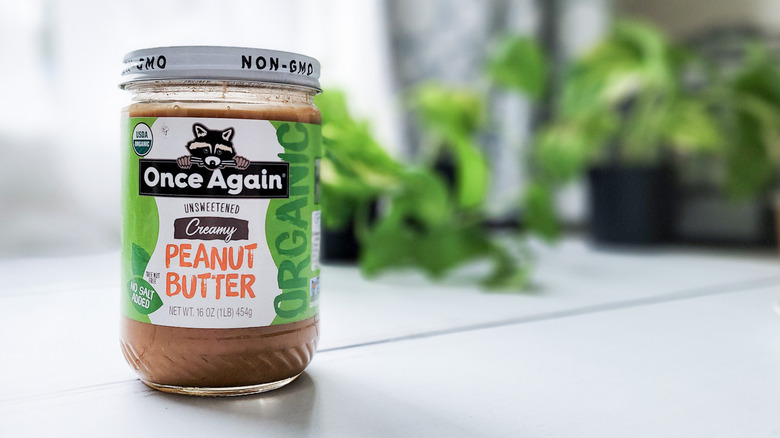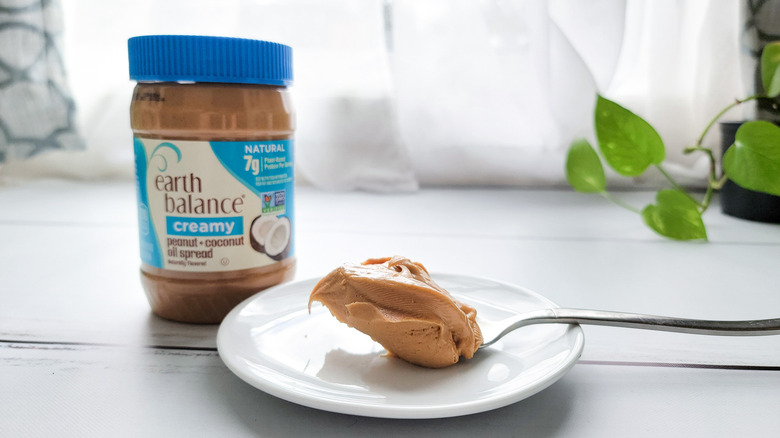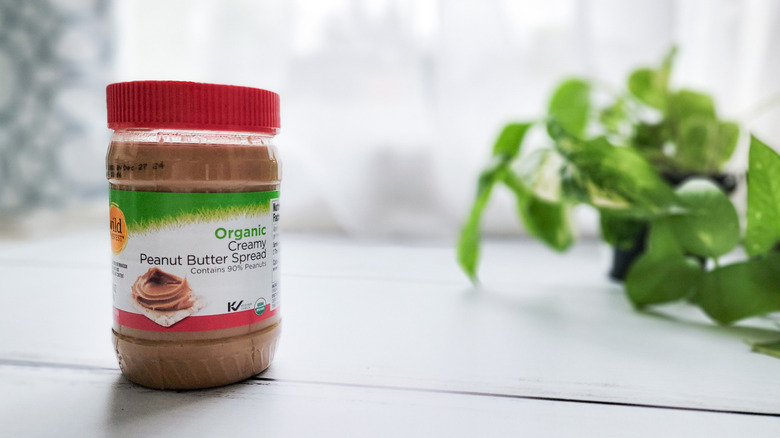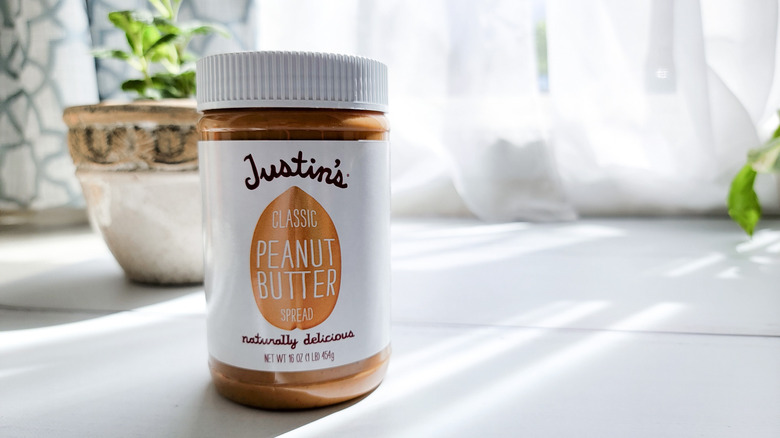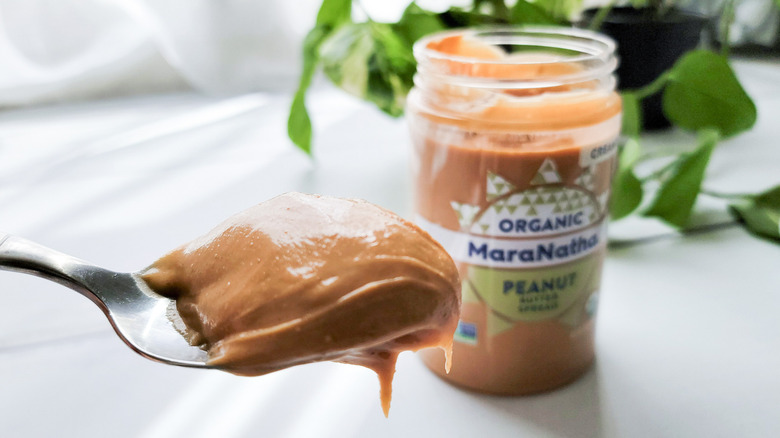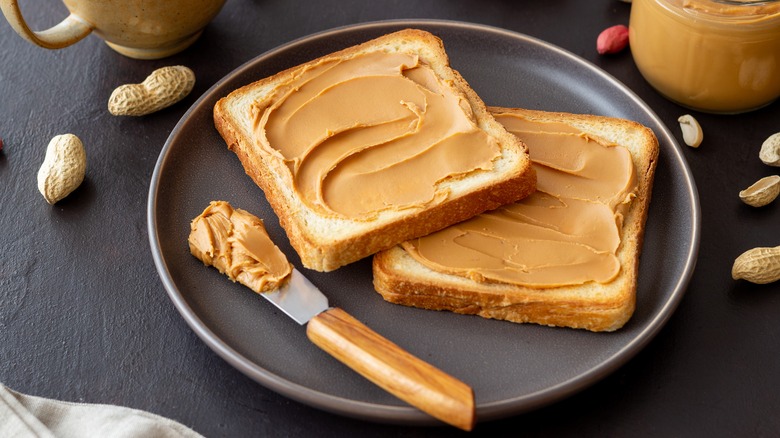Peanut Butter Brands You Should Buy And The Ones You Should Avoid
If you're a red-blooded American, then you like peanut butter. Or at least, you accept its ubiquitous presence in your life as an inevitability. The peanut (Arachis hypogaea), though not really a nut at all, is still consistently ranked as the most popular one in the world.
Even those who don't understand why you'd want to lick it off a spoon can at least appreciate its high protein content and significant contribution to the U.S. economy, to the tune of $1.47 billion. And come on, if it weren't so popular, would it have made it into the hit film "Meet Joe Black" as Death's preferred treat on Earth?
At Chowhound, though, it's not enough simply to love something; we're looking for the absolute best version of it. Hence this handy guide of peanut butter brands that offer peak enjoyment and those you can safely skip, based on real science! And by science, we mean a blind taste test that included one husband, one grandmother, two children, and a couple of dogs who were only too happy to deal with the leftovers.
In all seriousness, the following roundup includes most of the top peanut butter brands available in the U.S. as well as a recommendation to buy each or leave it be. Next time you stand in the peanut butter aisle facing crippling analysis paralysis, you can at least dismiss half the items ... and maybe even try something new.
Avoid: Jif
First up, Jif. My family was convinced this was their favorite peanut butter, despite me insisting for years that Skippy was the better-tasting brand. And guess what? The blind taste test showed this in no uncertain terms, with Skippy ranking in at an overall score of 3.65 and Jif only garnering 3.05 out of 4. While they ranked equally in creaminess and spreadability, Jif was majorly dinged on flavor and willingness to eat it plain.
It's only fair to note that they both earned a 4.8/5 in Amazon reviews. However, it's also fair to note that most people who leave reviews come because they had a positive experience, so this is a little biased (just like our taste test).
Finally, Jif is less expensive than most brands. Compared to Skippy, this is only by a slim margin, at $3.29 compared to Skippy's $3.99. However, if you count pennies, as many of us do, then this could add up significantly by the time you make a monthly tally.
Buy: Skippy
As discussed above, Skippy is the better brand in terms of taste and standalone capacity. It earned a 3.4 to Jif's 2.8 for flavor, and a 3.2 to 2.2 for whether you'd eat it off a spoon. Everyone was shocked (except yours truly). Pricewise, it's in the bottom third of this ranking, so that won't prove a deterrent to regular consumption.
If you're going to make the yummiest peanut butter and jelly sandwich, therefore, Skippy is the way to go. It spreads well, blends wonderfully with jams of all kinds (strong preference for strawberry in this household), and is even the one Ina Garten chooses for her elevated peanut butter and jelly sandwich.
However, like Jif, Skippy contains both vegetable oil and sugar. It's the best bet out of this twosome, and was the overall winner of the entire ranking, tied only with its close cousin, Skippy Natural (more on that below). However, if you're looking for something with a shorter ingredient list, you'll want to take another route, next.
Avoid: Santa Cruz
At $8.99, Santa Cruz ties with once again as the second-priciest creamy peanut butter in this ranking, and one of the absolute most expensive on the store shelf (even if you account for crunchy and flavored varieties), aside from nut butters made with spendier nuts such as almonds and cashews. It lost out only to MaraNatha for pure sticker shock.
Moreover, though, it just didn't taste that great. I was immediately put off of it because, not eating it blind, I could see its ingredient list and, well, I love sugar. But the blind taste testers could tell instantly that it boasted a weird combo of no sweetness + palm oil that just doesn't sit well on the palate. For that reason, it scored an overall of 2.45, with a rock-bottom 1.4 in willingness to eat it alone (comparable only to the cheapest brand in the store, Essential Everyday). At that price, no thank you.
Buy: Adams
Turns out the peanut butter of my childhood actually was one of the best overall. Write this down, Mom: apparently you did know what you were doing. Admittedly, Adams does also boast that special combination of palm oil and no added sweeteners, but in this case, it wasn't weird. The only possible difference is that Adams' ingredient list says "2% or less of vegetable monoglycerides (from palm oil)," where Santa Cruz makes no such claim. One wonders if the strange canned taste comes from extra oil.
This doesn't stop Adams from being creamy, though. That's because, unlike the versions I had to stir in halcyon days, this one does contain palm oil. (It's worth noting that Adams still makes versions that don't.) In summation, if you're looking for a peanut butter that contains no sugar, but doesn't require you to stir for hours, Adams No-Stir is the ticket. And at only $5.49, it's pretty affordable for a more natural option. Worth noting that while Adams and Santa Cruz are mostly tied online, and both have crunchy versions, the Adams has significantly more reviews than Santa Cruz.
Avoid: Essential Everyday
For those on a budget, Essential Everyday pops off the shelf right away. It's only $1.99, contains the same ingredients as any other peanut butter (peanuts, oil, salt, and sugar), and looks creamy as heck. Unfortunately, for reasons unbeknownst to the testing team, it tastes abominable, ranking right at the bottom of the set with a 1.2 in flavor and 1.4 for standalone ability. Yikes. Apparently you really do get what you pay for.
To its credit, it is highly spreadable. Disguised by a bread that has some actual flavor (such as Dave's Killer Bread, for example) and paired with jam, it can fake its way through a sandwich just fine. (Perhaps this is why the peanut butter and jelly sandwich was invented.) You won't want to eat it off a spoon, though. In all likelihood, this is one you should skip unless you're making peanut butter cookies or Elvis cake for a really, really undiscerning audience.
Buy: Skippy Natural
Say, hello to Skippy Natural, tied for first place in overall ranking and a very decent price at only $3.99. While its ingredient list is mostly the same as regular Skippy, it uses only palm oil as opposed to hydrogenated vegetable oil from multiple sources (specifically cottonseed, soybean, and rapeseed oils). Rounding out its "natural" claims is the fact that it is certified non-GMO (which stands for no genetically modified organisms).
You're right, of course, to wonder how Skippy Natural can really be that much better if it doesn't cost any more than the regular variety, but some mysteries remain unsolved. If you take the approach that fewer ingredients are better, as most consumers now do, then Skippy Natural wins out. On a final note, it is worse than difficult to find reviews of Essential Everyday online, and the only one I found was for one star.
Avoid: Ferris Nut Co.
This writer is all for natural, having made her own homemade nut butter numerous times and even chanced a Nutella recipe on one memorable (not in a good way) occasion. However, it's possible to take things too far. If you really want the pure and organic peanut experience, buy a lightly roasted and salted batch and just munch away, because that's about how much chewing you're going to have to do to get through this bad boy. Seriously, creamy? Ferris Nut Co. has clearly never heard of it.
One thing Ferris Nut Co. does have going for it is the price, though. It's only $4.49 for a product that contains only peanuts and salt. They do list peanut oil as a separate ingredient to better emulsify it, but the ingredient list is still short and sweet. It's not a terrible brand, but the peanut chunks in it are so visible that you couldn't be blamed for mistaking it as crunchy. Therefore, you shouldn't choose it if you really want a creamy blend, though it would probably make for dope cookies.
Buy: Once Again
While Once Again is significantly more expensive than Ferris Nut Co., it's the preferred choice because when they say creamy, they actually mean it. You don't have to chew your way through this peanut butter, even though it is $8.99. Backing up its winning score in our house (to be fair, only 2.35 to Ferris's 2.1 due to the lack of sugar in both) are online reviews that overwhelmingly favor Once Again.
A short anecdote in its favor: While shopping for peanut butter at the store, my son and I were asked by a woman in her 60s what we were doing. We explained about our peanut butter roundup, and she pulled Once Again off the shelf and told us to try it, despite the price. She explained that after undergoing several intense rounds of chemotherapy, it was the only peanut butter that didn't make her lose her lunch. Even if the sample size is small, that has to mean something.
Avoid: Earth Balance
The taste test admittedly went a little farther afield on the Earth Balance choice, because this one has coconut oil in it. To be fair, it was impossible to choose one without confounding ingredients, as their only other creamy brand contained flaxseed. The coconut oil blended nicely with the sugar though, transforming peanut butter into something that tasted like a weird, spreadable candy.
It would probably be good in a healthier baked treat, such as banana bread with peanut butter, though at $7.99, if you're going to use a bizarre peanut ingredient, a peanut butter powder might almost be better. To be fair, Earth Balance got perfect scores for creaminess and spreadability, and earned an overall 3.1 compared to Wild Harvest's 3.35 (the winning brand in this combo). Considering that Earth Balance is prevalent online and earned pretty good reviews, and Wild Harvest is difficult to source reviews for at all, you're well within your rights to choose this one instead. But stay tuned ... we have our reasons.
Buy: Wild Harvest
The main factors making Wild Harvest win out? Because it is $2 cheaper at $5.99, and if you eat a lot of peanut butter, that adds up. Plus, Wild Harvest doesn't have nontraditional ingredients. If you like flavored things, then Earth Balance is a good choice overall, but around here we're looking for the good old-fashioned peanut flavor, enhanced only by a little salt and sweetness.
Wild Harvest also has an organic version, whereas Earth Balance does not (or at least none that we could find). Since some shoppers put this quality at the top of their list of priorities, it's a dead cert against its competitor in that arena. Flavor-wise, the blind taste test also puts it squarely in the lead. While the two were roughly comparable for spreadability and creaminess, the flavor and standalone factors of Wild Harvest pulled considerably ahead at 3 to 2.6 and 2.8 to 1.8, respectively.
Avoid: Justin's
Next up in the peanut butter cage match listings: Justin's versus MaraNatha. This is not a straight-across comparison, since Justin's does not contain sugar and MaraNatha does. That gave MaraNatha a pretty big flavor advantage, which shows in the rankings. Justin's did not win big in that category, clocking in at about a 2 in our home.
However, it got relatively good ratings for spreadability and does have a decent peanutty flavor. For those that don't consume sugar with their nut butters, it's an okay bet, although there are unsweetened versions that are better. The main complaint dragging it down is that Justin's is kind of gritty (1.6 on creaminess), so it doesn't have that perfect smooth factor that Ina Garten would want on a sandwich.
For those that do like sugar with their nut butters, never fear: Justin's has an entire line of sweetened products. Although I don't like anything else in their line, including the chocolatey items (and that's saying something), the honey peanut butter is an exception. However, Justin's cost $6.99 for a nut butter that isn't in any way verifiably natural even though its branding makes a big deal out of being "naturally delicious." A point against.
Buy: MaraNatha
If there is one place in which the blind taste test and the American public diverge considerably, it is in the Justin's vs MaraNatha face-off. Everyone online freaking loves the Justin's unsweetened variety, and it was hard to find a complaint against it. Either they have really good marketing, or the unavoidable sugar factor of our taste test prejudiced us against it.
Either way, MaraNatha got an overall score of 3.1 to Justin's 2, is certified USDA Organic, and contains only four ingredients. In the battle for natural, it definitely wins. If you need a reason not to buy it, though, just know that MaraNatha is $9.99 a pop. If you go through peanut butter like our family of four (plus not-so-occasional visits from Grandma), then you might find it a strain on your budget. However, it's more natural and much better-tasting, in our opinion. If memory serves, the unsweetened version (not available where we shopped) is really creamy too.
Storing peanut butter to last
Unless you've been living under a rock for the past ... ever, then you've likely already chosen a stance in the great Fridge Versus Cupboard Debate. Some people swear peanut butter should only live in the cupboard, pointing out that rock-hard nut butters are, frankly, gross. Others reason that unless you put peanut butter in the fridge, it will spoil too quickly. In the end, it's a matter of climate and personal preference. (When my family lived in Belize, we kept peanut butter in the fridge, but we don't in Oregon.)
Wherever you stand, here are some basic guidelines. The United States Department of Agriculture recommends you store your peanut butter for no more than nine months in the pantry unopened, and no more than three opened. Note that natural nut butters spoil more quickly, on average. A study in the Journal of Food Science and Technology reports that at temperatures between 75 and 95 F, peanut butter goes off closer to four weeks. If you hit your max time for peanut butter pantry storage, you can always move it to the fridge for another 3 months of shelf life. Or, like us, just give it to a dog.
How we evaluated peanut butters
Okay, you're wondering, is sitting around a dining room table with your family loudly comparing peanut butters to various substances (manna from heaven, animal droppings) really science? Maybe not, but for the average American family, I'm guessing the scene wouldn't have looked too crazy either.
This writer has had a lifelong love affair with peanut butter. Because I was raised on Adams, the one with an inch of oil that you absolutely cannot stir in without making a huge mess, in childhood I sought out every opportunity for Jif and Skippy I could find. Why look elsewhere? But over the decades, peanut butter options have become more numerous, so we wanted to compare how good those are to the basics that have been around forever (Jif was founded in 1958, Skippy in 1933, and Adams in 1916).
To do so, we designed a blind taste test in which we used only creamy peanut butters to avoid confounding variables. Then all five of us tried the peanut butters, with everyone but me tasting them blind. We then ranked each on a 1-4 scale according to flavor, creaminess, spreadability, and how likely you'd be to eat it on its own. Some quick number-crunching resulted in averages for each category, then an overall average ranking for each peanut butter.
Using this information, plus the ingredients list and a quick look at online reviews, we created the above list of brands to buy and brands to avoid. It's important, also, to make a note about ingredients.
It is impossible to remove all confounding variables in this ranking. The dirty truth is more peanut butter brands contain sugar than don't, so this unbalanced list is an accurate depiction of what's on the store shelves. If you are looking for sugar-free options, try Adams No-Stir, Santa Cruz No Stir, Once Again Unsweetened, or Justin's Classic (all of them the versions we used above).
All of the peanut butters chosen also contain palm oil, with the exception of Justin's and Once Again. Palm oil, which emulsifies the mixture to prevent oil separation, is what makes creamy peanut butters so creamy. There are options to avoid both it and sugar, and we took that into account with our recommendations, even if a natural brand ranked a little lower than a sugary one in the blind taste test. (Our brains are wired to reward sugar consumption, after all.)
How much do added ingredients matter? While sugar isn't good for you, research published in the Journal of Nutrition has shown that peanuts may lower the risk of cardiovascular disease. They also contain antioxidants, oleic acid, and omega-6 fatty acids, all of which are good for your health and may reduce the risk of diabetes. As such, peanut butter may be beneficial enough to eat with added sweeteners.
On a final note, most peanut butter brands have crunchy versions, and some have additional unsweetened options (though you may have to look harder for them). Price was a factor as well.
